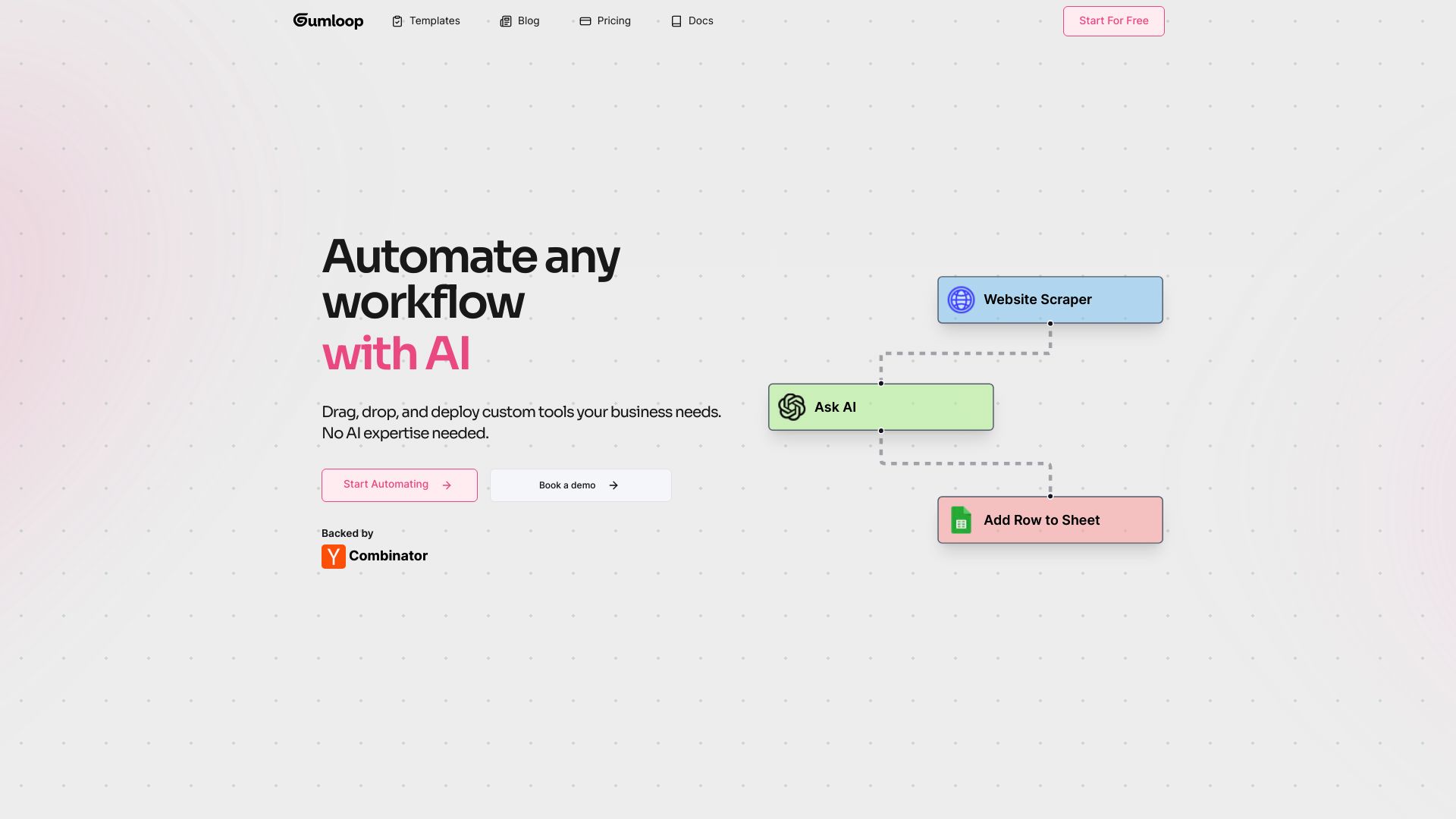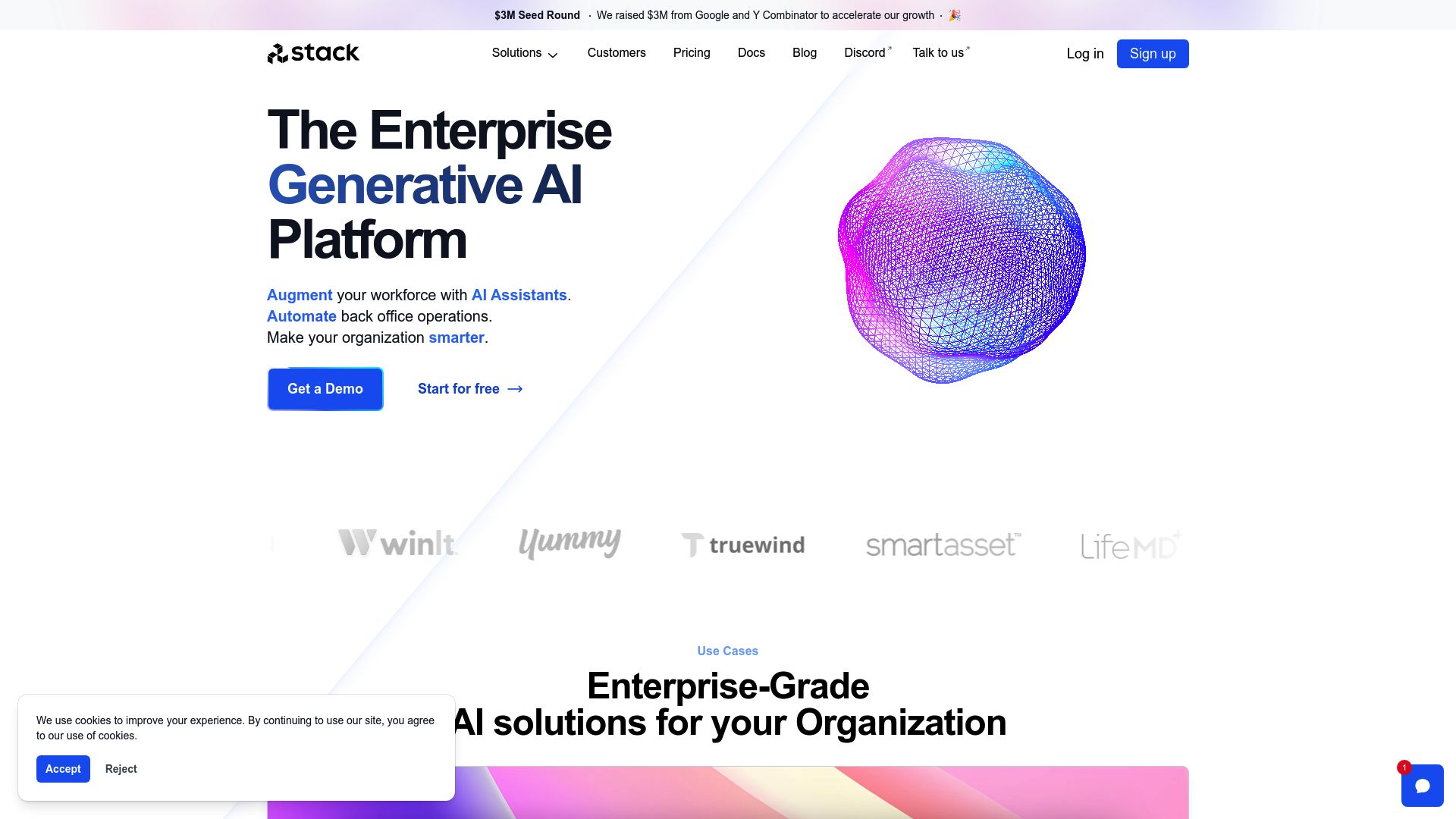AgentHub vs. Stack AI: Comparing AI Development Platforms
The AI development landscape brims with innovative platforms, each vying to simplify the creation of powerful AI agents. AgentHub vs. Stack AI stand out as formidable contenders, offering unique approaches to AI automation. AgentHub empowers users with a comprehensive suite of features and autonomous agents, while Stack AI excels in enterprise-grade security and seamless integrations.
This comparison delves into the strengths and limitations of both platforms, exploring their no-code interfaces, deployment options, and specialized capabilities. We’ll also introduce SmythOS, a cutting-edge alternative that addresses key gaps in both offerings. Whether you’re a seasoned developer or a business leader seeking to harness AI’s potential, this analysis will guide you through the critical features and use cases of each platform, helping you make an informed decision for your AI development needs.
AgentHub Overview
AgentHub empowers businesses to harness AI automation without coding expertise. The platform’s visual builder enables users to create customized AI-powered workflows through an intuitive drag-and-drop interface. AgentHub caters to various industries, offering pre-optimized agents and customizable nodes for tasks ranging from lead generation to complex problem-solving.
AgentHub empowers businesses to harness AI automation without coding expertise. The platform’s visual builder enables users to create customized AI-powered workflows through an intuitive drag-and-drop interface.


AgentHub excels in providing a comprehensive suite of features for AI agent development and deployment. The platform supports both development and production environments, allowing users to seamlessly transition from testing to live implementation. AgentHub’s autonomous agents leverage memory and context to perform tasks more accurately, while the platform’s multi-agent collaboration feature enables complex problem-solving through teamwork.
AgentHub’s autonomous agents leverage memory and context to perform tasks more accurately, while the platform’s multi-agent collaboration feature enables complex problem-solving through teamwork.
Security remains a priority for AgentHub, with data encryption and OAuth support ensuring protected access to AI agents and sensitive information. The platform integrates with various APIs and supports robotic process automation (RPA), expanding its utility across different business processes. AgentHub also offers deployment flexibility, allowing users to implement their AI solutions as APIs, webhooks, site chats, or scheduled agents.
While AgentHub provides a robust set of tools, it lacks some advanced features like a hosted vector database or specialized crawlers for sitemaps and YouTube transcripts. However, its strengths in no-code development, pre-built templates, and integration capabilities make it a valuable option for businesses seeking to implement AI solutions without extensive technical resources.
Stack AI Overview
Stack AI empowers users to create and deploy AI-powered workflows and custom assistants without extensive coding expertise. The platform’s visual, drag-and-drop interface democratizes AI development, making advanced capabilities accessible to a broad range of users.


Stack AI’s no-code environment supports the creation of sophisticated AI agents capable of autonomous operation, problem-solving, and multi-agent collaboration. Users can leverage pre-built templates for common use cases or customize solutions to fit specific needs. The platform excels in enterprise-grade security, offering compliance with SOC 2, HIPAA, and GDPR standards to ensure data protection and privacy.
Stack AI’s no-code environment supports the creation of sophisticated AI agents capable of autonomous operation, problem-solving, and multi-agent collaboration.
Integration capabilities stand out as a key strength of Stack AI. The platform seamlessly connects with popular services like Google Drive, Salesforce, Airtable, and Slack, enabling AI agents to interact with existing business ecosystems. This flexibility allows for the automation of complex workflows across various departments and industries.
While Stack AI offers robust features for AI development and deployment, it may face challenges in highly specialized or niche applications that require extensive customization beyond its no-code interface. Additionally, as with many AI platforms, users might encounter a learning curve when attempting to implement more complex, multi-step workflows or when integrating with legacy systems.
Stack AI positions itself as a versatile solution for businesses seeking to implement AI without significant technical overhead. Its combination of accessibility, security, and integration capabilities makes it particularly appealing for mid-sized to large enterprises looking to enhance efficiency and decision-making processes through AI automation.
Feature Comparison
AgentHub and Stack AI offer robust platforms for AI agent development, but key differences set them apart. AgentHub excels in providing a comprehensive suite of features for both novice and experienced users. Its visual builder and no-code editor democratize AI development, allowing users to create sophisticated workflows without extensive programming knowledge. AgentHub’s strength lies in its autonomous agents with memory and context capabilities, enabling more accurate and context-aware task execution.
Stack AI, while also offering a visual interface and no-code options, distinguishes itself with enterprise-grade security features. It provides compliance with SOC 2, HIPAA, and GDPR standards, making it an attractive option for businesses handling sensitive data. Stack AI’s integration capabilities are particularly noteworthy, offering seamless connections with popular services like Google Drive, Salesforce, and Slack.
However, both platforms have limitations. AgentHub lacks some advanced features like a hosted vector database and specialized crawlers for sitemaps and YouTube transcripts. Stack AI, while strong in security and integrations, may face challenges in highly specialized applications requiring extensive customization beyond its no-code interface. SmythOS addresses these gaps by offering a more comprehensive set of features, including a hosted vector database, advanced crawling capabilities, and greater flexibility for customization, positioning it as a more versatile solution for complex AI development needs.
Feature Comparison Table
| AgentHub | Stack AI | SmythOS | |
|---|---|---|---|
| CORE FEATURES | |||
| Multimodal | ❌ | ✅ | ✅ |
| SECURITY | |||
| Constrained Alignment | ❌ | ❌ | ✅ |
| Data Encryption | ❌ | ✅ | ✅ |
| OAuth | ❌ | ✅ | ✅ |
| IP Control | ❌ | ❌ | ✅ |
| COMPONENTS | |||
| Huggingface AIs | ❌ | ❌ | ✅ |
| Zapier APIs | ❌ | ✅ | ✅ |
| Classifiers | ❌ | ✅ | ✅ |
| Data Lakes | ❌ | ✅ | ✅ |
| DEPLOYMENT OPTIONS (EMBODIMENTS) | |||
| Staging Domains | ❌ | ✅ | ✅ |
| Production Domains | ❌ | ✅ | ✅ |
| API Authentication (OAuth + Key) | ❌ | ✅ | ✅ |
| Deploy as Site Chat | ❌ | ✅ | ✅ |
| Deploy as Scheduled Agent | ✅ | ❌ | ✅ |
| Deploy as GPT | ❌ | ✅ | ✅ |
| DATA LAKE SUPPORT | |||
| Hosted Vector Database | ❌ | ✅ | ✅ |
| Sitemap Crawler | ❌ | ❌ | ✅ |
| YouTube Transcript Crawler | ❌ | ❌ | ✅ |
| PDF Support | ❌ | ✅ | ✅ |
| Word File Support | ❌ | ✅ | ✅ |
| TXT File Support | ❌ | ✅ | ✅ |
Best Alternative to AgentHub and Stack AI
SmythOS stands out as the superior alternative to AgentHub and Stack AI for AI agent development and deployment. Our platform combines powerful features with unmatched ease of use, empowering users to create sophisticated AI solutions quickly and efficiently.
Unlike AgentHub and Stack AI, SmythOS offers a comprehensive suite of tools that cater to both technical and non-technical users. We provide a visual drag-and-drop interface that simplifies complex AI workflow creation, allowing users to build advanced agents without extensive coding knowledge. This democratization of AI development sets us apart from competitors, making cutting-edge technology accessible to a broader audience.
SmythOS offers a comprehensive suite of tools that cater to both technical and non-technical users… making cutting-edge technology accessible to a broader audience.
SmythOS excels in its extensive integration capabilities. While Stack AI offers some integrations, our platform supports a vast ecosystem of APIs, AI models, and third-party tools. This flexibility ensures that SmythOS can seamlessly fit into virtually any existing workflow or business process, a critical advantage over both AgentHub and Stack AI.
Our multi-agent orchestration feature surpasses the capabilities of both competitors. SmythOS enables the creation of collaborative AI systems where multiple agents work together on complex tasks, significantly enhancing efficiency and scalability. This advanced functionality is particularly valuable for enterprises looking to implement sophisticated AI solutions across various departments.
SmythOS enables the creation of collaborative AI systems where multiple agents work together on complex tasks, significantly enhancing efficiency and scalability.
Unlike AgentHub and Stack AI, SmythOS offers unparalleled deployment versatility. Our agents can be deployed across multiple platforms, including major cloud services and as ChatGPT plugins or Alexa skills. This flexibility ensures that AI solutions built with SmythOS can be easily integrated into existing systems, providing a significant advantage in terms of adaptability and reach.
Conclusion
AgentHub and Stack AI offer robust AI development platforms, each with unique strengths. AgentHub excels in providing a comprehensive suite of features for AI agent development, including autonomous agents with memory and context capabilities. Stack AI distinguishes itself with enterprise-grade security and extensive integration options. Both platforms democratize AI development through visual interfaces and no-code options.
However, SmythOS emerges as the superior choice, addressing limitations found in both AgentHub and Stack AI. Our platform offers advanced features like a hosted vector database, specialized crawlers, and greater customization flexibility. SmythOS’s “Create Once, Deploy Anywhere” approach allows seamless integration across multiple environments, from chatbots to APIs.
SmythOS stands out with its extensive integration ecosystem, supporting over 300,000 integrations and compatibility with various AI models. Our platform’s drag-and-drop interface, coupled with pre-built API integrations and templates, significantly reduces development time and complexity. The multi-agent orchestration feature enables sophisticated AI implementations, enhancing efficiency and scalability for businesses of all sizes.
For those ready to experience the future of AI development, we invite you to explore our diverse range of AI-powered agent templates or create a free SmythOS account to start building your own AI agents today. With SmythOS, you’re not just adopting a tool; you’re embracing a revolution in AI accessibility and capability.
Last updated:
Disclaimer: The information presented in this article is for general informational purposes only and is provided as is. While we strive to keep the content up-to-date and accurate, we make no representations or warranties of any kind, express or implied, about the completeness, accuracy, reliability, suitability, or availability of the information contained in this article.
Any reliance you place on such information is strictly at your own risk. We reserve the right to make additions, deletions, or modifications to the contents of this article at any time without prior notice.
In no event will we be liable for any loss or damage including without limitation, indirect or consequential loss or damage, or any loss or damage whatsoever arising from loss of data, profits, or any other loss not specified herein arising out of, or in connection with, the use of this article.
Despite our best efforts, this article may contain oversights, errors, or omissions. If you notice any inaccuracies or have concerns about the content, please report them through our content feedback form. Your input helps us maintain the quality and reliability of our information.
